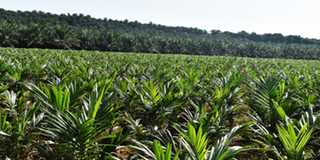Kyotera leaders backtrack on oil palm project

An oil palm field in Kalangala District. PHOTO/FILE
What you need to know:
- The locals accuse the government of failing to develop a relocation plan for residents occupying land allocated for the project.
- The government’s first attempt to reclaim land started in 2012, but residents have been putting up spirited resistance.
The leadership of Kyotera District has backtracked on its earlier commitment to support the oil palm project .
The locals accuse the government of failing to develop a relocation plan for residents occupying land allocated for the project.
The Kyotera District vice chairperson, Ms Agnes Namusitwa, told Daily Monitor that the government should first relocate 2,000 squatters spread in the sub-counties of Kakuuto, Kabira, Kasasa and Kyebe, where they plan to set up the oil palm plantations.
“As the district leadership, we have already taken a position that the government should first provide a comprehensive resettlement plan for sitting tenants that will be displaced by the project,” she said on Saturday.
Ms Namusitwa said the Project Affected Persons (PAPs) should be treated with dignity as most of them were duped by unscrupulous individuals who sold the land.
The 247 square miles land is reportedly occupied by pastoralists.
The government’s first attempt to reclaim land started in 2012, but residents have been putting up spirited resistance.
Due to continuous efforts, which included demolition of structures and heavy deployment of army in the area, some residents in April relocated their livestock to the nearby Tanzania, but remained occupying their homes.
Mr Moses Byakatonde, one of the affected residents, said some government officials had misled President Museveni that the land had no sitting tenants.
“It is unfortunate that the government is acting on deception. This was confirmed by the Prime Minister, Ms Robinah Nabbanja while inspecting Sango Bay in April,” he said, adding: “But we have people producing a lot of matooke, coffee, milk and Kyotera District gets a lot of revenue from Sango Bay.”
Mr Vincent Ntambiye, another sitting tenant, said he had a modern farm with an underground water tank and other modern farm equipment, but all were demolished.
“We lost more than Shs60 million in the demolition exercise in May even before getting any compensation. Our lawyers are already working on the matter to sue the government over malicious damage and losses,” he said.
Ms Connie Magumu Masaba, the coordinator of National Oil Palm Project (NOPP), said the compensation process will start soon, but only to bonafide occupants.
“Sango Bay is a government land and compensation will only go to legally known occupants, not squatters,” she said.
Ms Magumu revealed that the planned oil palm project is still in its initial stages.
“There are other prior activities such as evaluation of soils, setting up nursery beds, conducting an environmental impact assessment study and, obtaining an international license, which have not yet been done yet. The actual project may take another one year,” she added.
About the project
The oil palm project is expected to be implemented by Bidco Uganda, which already manages oil palm plantations on Bugala Island and outlying islands of Bunyama and Bubembe in Kalangala and Buvuma districts.
Initially, the Sango Bay land housed a sugar estate owned by the Sharad Patel family. It also has an airstrip, an internationally recognised wetland (Ramsar site) and four central forest reserves of Malabigambo, Kaiso, Tero, and Namalala that cover a combined area of close to 60 square miles.
A big chunk of the land is being used by herders for grazing.





